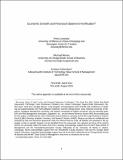Economic Growth and Financial Statement Verification
Author(s)
Lisowsky, Petro; Minnis, Michael; Sutherland, Andrew Gordon
DownloadSutherland_JN_2017_Economic_Growth.pdf (1.166Mb)
OPEN_ACCESS_POLICY
Open Access Policy
Creative Commons Attribution-Noncommercial-Share Alike
Terms of use
Metadata
Show full item recordAbstract
We use a proprietary data set of financial statements collected by banks to examine whether economic growth is related to the use of financial statement verification in debt financing. Exploiting the distinct economic growth and contraction patterns of the construction industry over the years 2002–2011, our estimates reveal that banks reduced their collection of unqualified audited financial statements from construction firms at nearly twice the rate of firms in other industries during the housing boom period before 2008. This reduction was most severe in the regions that experienced the most significant construction growth. These trends reversed during the subsequent housing crisis in 2008–2011 when construction activity contracted. Moreover, using bank- and firm-level data, we find a strong negative (positive) relation between audited financial statements during the growth period, and subsequent loan losses (construction firm survival) during the contraction period. Collectively, our results reveal that macroeconomic fluctuations produce temporal shifts in the overall level of financial statement verification and temporal shifts in verification are related to bank loan portfolio quality and borrower performance.
Date issued
2017-09Department
Sloan School of ManagementJournal
Journal of Accounting Research
Publisher
Wiley
Citation
Lisowsky, Petro, Michael Minnis, and Andrew Sutherland. “Economic Growth and Financial Statement Verification.” Journal of Accounting Research 55, no. 4 (March 21, 2017): 745–794.
Version: Original manuscript
ISSN
0021-8456